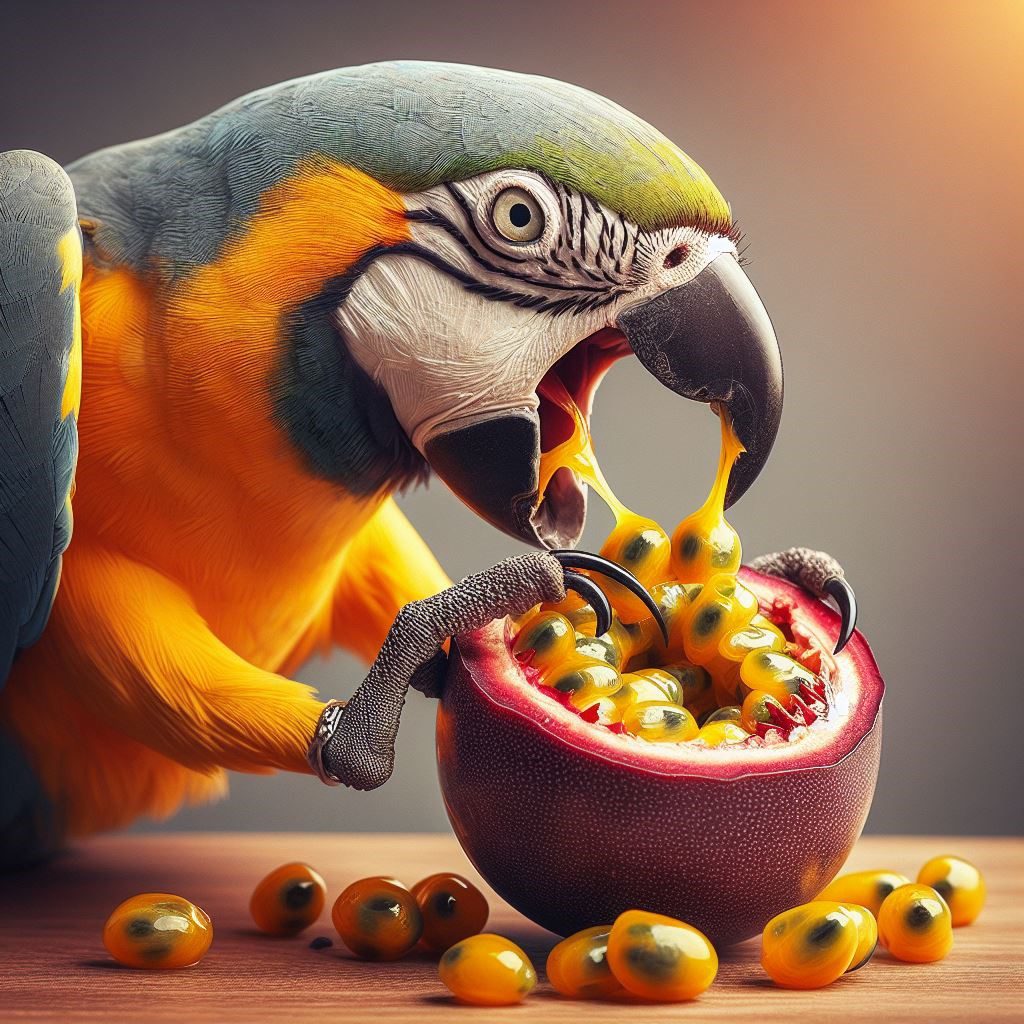Parrots need a well-balanced diet in order to live a long and happy life. A diet full of quality vitamins and nutrients will prevent them from many health problems so as a parrot owner it’s important to feed them the best foods. Your bird’s diet should consist of seeds, pelleted foods, nuts, and around 15-20% fresh fruits and vegetables.
However, all fruits aren’t suitable to give them and some can actually harm your parrot instead of improving its quality of life. Is passion fruit one of them? Let’s find out.

Can parrots eat passion fruit? Yes, parrots can eat passion fruit, the only danger they bring is the mess your parrot is going to make while eating it. Passion fruit is not only safe to feed your parrot but actually contains many nutrients like fiber, vitamin C, A, iron, and potassium and they are a great source of antioxidants. The only part of passion fruit your parrot can’t eat is the rind, similar to humans.
Passion Fruit Benefits For Parrots
We know passion fruit is good for our parrots, but just how good is it? Let’s take a closer look at the nutritional content.
1 small passion fruit contains the following nutrients :
| Calories | 17 |
| Protein | 0.4g |
| Carbs | 4g |
| Fat | 0.1g |
| Fiber | 1.9g |
| Sugar | 2g |
High In Fiber
One small passion fruit contains almost 2 grams of fiber. This nutrient is needed mainly to help with your parrot’s digestive system. There are two types of fiber: soluble and insoluble fiber. Both play different roles in your parrot’s body.
The health advantages of fiber are :
- Weight control – foods high in fiber are more satiating therefore your parrot will eat less
- Better digestive health – less likely to develop stomach cancers
- May help your parrot live longer
- Important for cardiovascular health
Strawberries, raspberries, bananas, carrots, beets, and Brussels sprouts are all other options that are high in fiber similar to passion fruit.
Vitamin C
Passion fruit also contains vitamin C, a powerful antioxidant that can protect your parrot from age-related illnesses like cancer or heart disease. It does this by working against unstable atoms in the body called free radicals, these substances aim to do harm to your parrot cells, while antioxidants work to protect them.
The benefits of vitamin C don’t stop there, here’s an extensive list :
- Regulating blood pressure
- It’s an anti-inflammatory
- Prevents cataracts in the eyes
- Removes plaque from blood vessels
- Lowers cholesterol
- Regulates blood sugar
Guava, oranges, strawberries, broccoli, brussels sprouts, mango, and kale are all safe alternatives of vitamin C your parrot can enjoy.
Vitamin A
Vitamin A is an antioxidant present in passion fruit that aids in the growth and repair of cells.
It’s also needed for :
- Skin health
- Eye Health
- Protecting the bones
- Supporting the immune system
- Mucus membranes
Unfortunately, a vitamin A deficiency is common in parrots and it’s usually found in those on an all-seed diet. This can cause problems like infections due to a weakened immune system, skin problems, poor feather quality or feather plucking, and inability to get rid of mucus that contaminates them.
Signs and symptoms your bird might be deficient in vitamin A include :
- Sneezing
- Nasal discharge
- Low appetite
- A difference in feather quality
- Eye discharge or swelling
- Frequently thirsty
To avoid this feed your parrot foods rich in vitamin A like carrots, squash, cantaloupe, broccoli, mango spinach, and red peppers.
Iron
Passion fruit contains some iron too, a mineral your parrot needs to create hemoglobin, a protein responsible for transporting oxygen into the blood.
Your parrot needs iron to help control their body temperature along with :
- Increased energy and focus
- Boosts the immune system
- Helps with abdominal processes
Potassium
Parrots need potassium for muscle contractions, to help regulate fluid balance, the transmission of messages throughout the nervous system, and to protect multiple organs in the body like the heart and kidney.
Foods high in potassium include :
- Bananas
- Lentils
- Apricots
- Spinach
- Broccoli
Full Of Antioxidants
Passion fruit contains a number of antioxidants that help your parrot cells against the damage done by free radicals. Their job is to damage the body when they are present in high numbers, antioxidants work to eliminate them and stop any harm from coming.
The antioxidants present in passion fruit are polyphenols and beta-carotene.
Polyphenols: Reduce the risk of inflammation preventing things like heart disease.
Beta carotene: An antioxidant that helps with the immune system along with its anti-cancer properties.
How You Should Feed Passion Fruit To Your Parrot
Feeding passion fruit to your parrot is a rather simple but messy process. Simply slice the passion fruit in half scoop out the goodness with a spoon and serve to your parrot.
You can also slice it in half and leave the flesh inside for your parrot to pick away at themselves, some prefer this as they get the mental stimulation from earning the food.
Can Parrots Eat Passion Fruit Seeds?
We know parrots love seeds but can they eat passion fruit seeds? The answer is yes they can, passion fruit seeds are completely safe for our parrots to eat and actually contain some health benefits your parrot can reap the rewards from.
The advantages of passion fruit seeds are :
- Rich in antioxidants that can protect your parrot cells from becoming damaged
- They are great for cardiovascular health
- High in magnesium
- High in insoluble fiber
Can Parrots Have Passion Fruit Juice?
Many parrot owners like to make their birds some fruit juice as an alternative way to feed them. This can be a great way to give your parrot vital nutrients if they don’t like something whole.
Parrots can drink passion fruit juice safely, just blend it up well and serve it to them but limit how much you give them as they would happily drink more than they could eat. A passion fruit juice is also going to be a much cleaner way to serve your parrot, you won’t have to worry about the mess afterward.
However, not all passion fruit juice is suitable, like ones bought from the store. Avoid giving this type of juice to your parrot as they are typically filled with sugars, preservatives, and additives that are of no benefit to your parrot. The best way to give your parrot passion fruit juice is to buy organic passion fruit and blend it up at home. This way you know what exactly is going into it.
What Other Foods Can Your Parrot Eat?
You know passion fruit is safe for your parrot to eat but if you’re like me then you’re always looking for new foods to improve your parrot’s diet to create some variety and include vital things that aren’t already in your birds diet.
So what other foods can your parrot eat?
- Fruit & Vegetables
Foods like asparagus, broccoli, carrots, peppers, bananas, blueberries, and pineapples are all fine and encouraged for your parrot to eat.
- Nuts
Things like almonds, Brazil nuts, cashews, hazelnuts, pistachios, and walnuts can be fed to your parrot. Just be wary of the fat content in some of them so they may need to be treated as a snack for your parrot. We don’t want them getting fat!
Passion Fruit For Parrots – Final Thoughts
Passion fruit can be an excellent addition to your parrot’s diet due to how nutrient-dense it is for being a small fruit. They can eat the flesh and seeds however the skin is inedible and shouldn’t be fed to your bird. You could also make a delicious fruit juice by blending it up and giving it to your parrot like that and you don’t even have to deal with the mess!
I hope you have found this useful and your parrot enjoys passion fruit as a nutritious snack!






